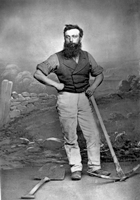To A City Friend Poem by Alexander Anderson
To A City Friend
You prate about your busy town,
And look upon myself with pity,
As something too much overgrown
To grace your cultivated city.
You think me rough and crude as yet,
Of dwarf'd and undeveloped stature,
And hint the city's wear and fret
Can tone one down to smoother nature.
I hear you speak without a qualm,
And soundly rate my village dulness,
But, bless you! I'm not Charles Lamb,
To weep at all your city's fulness;
I like the street as well as you,
With all its short, firm, certain paces,
But still one tires to have for view
An endless magic slide of faces.
But here I sit beside my books,
Sole hermit of the teeming quiet,
And put on very solemn looks,
When some stray thought comes out with 'fiat;'
The sunbeams from the setting sun
Come through the window softly peeping,
As if they said, 'You're all alone,
Old fellow, we have caught you sleeping.'
From here I wander out at will,
In wild Bohemian flights of fancies,
Or gather with a simple skill
New rhymes when in poetic trances.
A very modest Timon, I
Look back upon your teeming city,
And proffer you, with half a sigh,
A share of what you give me—pity.
Within the town you cannot get
A single moment for reflection,
Or wipe from off your brow the sweat
That's apt to spoil a fair complexion;
But just a jostle, strain, and strive
To reach a large result in money:
Ach himmel! but your human hive
Sends into market bitter honey.
'The human tide that sweeps along,'
(I quote this passage from your letter),
'Can stir the pulses till they throng,
And start those thoughts that make one better.
For here we have our fellow-men
Epitomised, and all the labour
Of hand and tool and thought and pen
Brought out, and ranking with its neighbour.
What high impulses work with me,
When all around I hear the sighing
And moaning of the human sea,
As to some greater voice replying.
I stride in front as if to bend
The tumult back that still will cumber,
And wishing that my village friend
Were with me to shake off his slumber.'
Well, well; you have your streets which lead
To all the world, so Schiller tells us;
But this truth has no earthly need
To make me follow Paracelsus.
I watch them from afar, nor dim
My brain by vague philosophising,
Nor wish to take a plunge, like him,
For friends to wait and see me rising.
But come and spend a day with me,
And I shall lay aside the shovel,
And argue with you till I be
Like Gil Blas in Le Sage's novel—
Or we shall take a gentler task,
And lie, half dreaming in the hollows,
And hear, as in the sun we bask,
Some distant engine playing solos.
Or books. What say you to an hour
Of Tennyson, or uncouth Browning,
Or naughty Swinburne's rampant power
That keeps this straight-laced decade frowning?
Or, better still, if you will come,
We'll read together, just to tease you,
Molière's 'Le Bourgeois gentilhomme,'
And I shall be Jourdain to please you.
I lean back and I fix my eye
Serenely on the airy distance,
You rise, and, waiting for reply,
You shake your head with dumb persistence.
You city limpet, keep your streets
That spoil some acres of good tillage,
And I shall sip my rural sweets,
And eat my lotus in the village.
But scherz bei seite, all this talk
Which round your sportive letter rallies,
Is but mere jokes I like to crack,
And must be ta'en **** grano salis.
I like the town as well as you,
And when my blood gets dull and thicken'd
I yearn for one wild scamper through
Its streets to get its current quicken'd.
And what just now with books and rhyme
I feel I need some slight renewing,
So I must snatch a little time
To see what all my kind are doing.
Per Bacco, here I toss about
My books that breed such fret and sorrow,
And so, du guter mensch, look out,
For I shall be in town to-morrow.
This poem has not been translated into any other language yet.
I would like to translate this poem